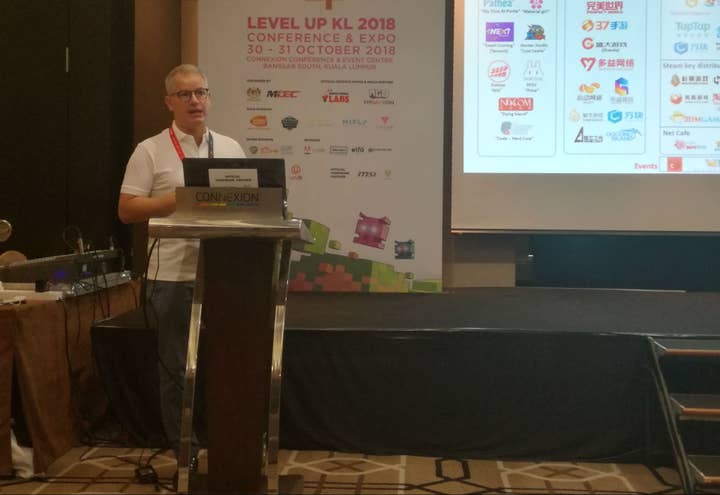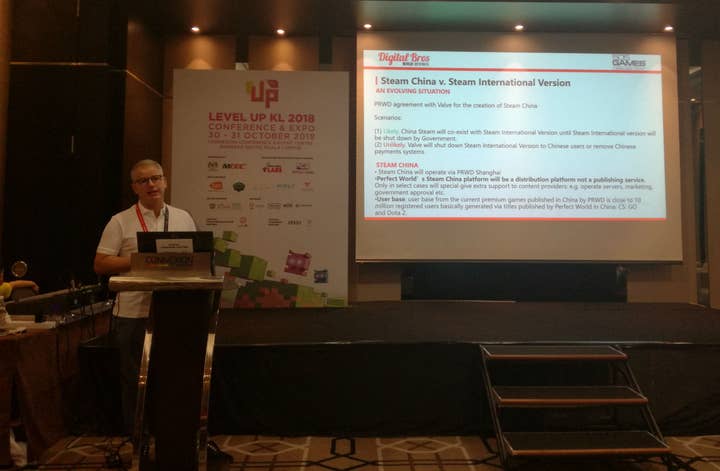"The Chinese government just doesn't see games as a priority"
At Level Up KL, 505 Games' Thomas Rosenthal explored the upheaval caused by the freeze on game approvals in China, and the uncertainty still to come
Doing business in China has never been simple for foreign games companies, but the future is likely to bring even greater uncertainty. According to Thomas Rosenthal, general manager of Asia-Pacific for 505 Games, the freeze on game approvals is months away from being over, and it will leave a host of new issues to solve.
Rosenthal was speaking at the Level Up conference in Kuala Lumpur, Malaysia last week, in a talk ostensibly about the growing opportunity for premium independent games in the Chinese market. Unsurprisingly, though, a great many of his points were undercut by the fact that, for now at least, licenses for new games are not being granted.
In China, he said, the current period is referred to as "the winter of the games industry". This is intended to be a joke, of course, but that morbid humour masks a very real impact on many companies with business interests in the country. Previously, Rosenthal continued, the six- to eight-month approval process was painful, but with patience and a Chinese partner it provided a reasonably sure, defined path into the world's biggest marketplace.
"The assumption that Tencent was very linked to the Chinese government failed when we saw the Monster Hunter issue"
The freeze on game approvals has undermined what certainty once existed, and the certainty around one company in particular: Tencent, from which myriad companies in North America and Europe have taken investment and funding precisely because of the friction it promised to remove.
"Tencent is always under government spotlight," Rosenthal said. "The assumption that Tencent was the most powerful Chinese company, and very linked to the Chinese government, actually failed when we saw the Monster Hunter issue. The reality is that all local publishers need to comply to law in China."
Perhaps the most worrisome aspect of the current situation in China is the degree to which it has harmed Tencent, one of the country's leading companies, and one that makes 50% of its revenue from games. The fact that government action has been a major contributor to the loss of nearly half of Tencent's stock value in the space of just a year shows the degree to which games is, as Rosenthal put it, "not a priority sector."

"I wouldn't say that it has an objective," Rosenthal added, addressing the freeze on game approvals specifically. "I would say that the Chinese government just doesn't see games as a priority. It just doesn't care if the games industry goes bust, or if global developers fail.
"Which is interesting, because I've always said that high-technology companies in China like Tencent grew and expanded across many sectors thanks to games, thanks to the cash-flow from games. There is a very interesting association between the top games companies and the top IT companies in China.
"NetEase is one of the top game companies, and it is also one of the top internet companies in China, and that's the same with Tencent. This whole government approval freeze will definitely hurt the games industry, and also the IT industry in China."
"It's very difficult to see who's going to lead, who is going to stifle the regulations and supervise the industry moving forward"
Insight on when the freeze will end is drawn entirely from speculation, much of it vague, with Chinese New Year the most hopeful target currently making the rounds. That is one year after it started, Rosenthal pointed out, meaning that there are a great many games -- "thousands" -- waiting in the queue. "I'm not sure how the government will absorb this lag," he said. "It's another topic that we all need to consider."
In part, this lack of knowledge about what lies in even the immediate future for the Chinese market is down to what Rosenthal suggested was conflict within the government. "It is not a monolith," he said, with two organisations, the Ministry of Culture on one side, and the State Administration of Publication and Press, able to halt and barricade progress for the games industry.
"But now, even the Propaganda department is into this controversy, and in many cases [all three] have the same power from a political power perspective," he continued. "It's very difficult to see who's going to lead, who is going to stifle the regulations and supervise the industry moving forward. I think that's what they're trying to work out right now.
"Plus, they will further restrict and they will further specify what are very discretional rules and regulations right now. My expectation is that the winter will go on for more than three months."
The one salvation amid this tumult is Steam, the rapid growth of which in recent years has been powered by Chinese gamers. In fact, the rise of the platform was helped by the Chinese government's more stringent approvals process, which made Valve's platform and the grey area it inhabited by far the simplest way to play a wide variety of uncensored games.

"The government in China didn't realise that by pushing and establishing an approval process it would benefit a foreign company," Rosenthal said. "This is the paradox in China right now. Steam operates in a grey market, and it continues to grow its userbase by at least 50% every year. We can see that its active users are in excess of 50 million [in China], and its monthly active users are around 30 million.
"Steam is by far the biggest channel in China, and it is an unwanted result, from a government perspective, of the approval process. This is why WeGame, which is supported by Tencent, the biggest games company in China, is actually struggling in the market. The reason? There are very few games on it compared to Steam. There are fewer options."
"Steam is by far the biggest channel in China, and it is an unwanted result, from a government perspective, of the approval process"
The ability to still reach Chinese gamers with Steam keys has been "particularly important" over the last year, in particular; a period in which Valve has further consolidated its influence in China by offering "a wide range of options, a wide range of games" from the comfort of its grey area.
"Unless Steam is shut down, I don't see why we shouldn't all be investing in and continuing to believe in this market," Rosenthal said. "I'm still positive, and I'm positive because I see [Chinese] game publishers that are still willing to put money on the table for big IPs. They are still willing to pay money to bring IPs into the local market, even though they believe it will be painful to bring those IPs to China."
The statement "unless Steam is shut down" is certainly ominous, but it's not outside the realms of possibility -- especially since the announcement of Steam China, in partnership with Perfect World, at E3 this year. "We were quite surprised," Rosenthal said, noting once again the huge reach of the international version of Steam in China. There is great uncertainty here, too, about what relationship the two storefronts will share, or whether they are even supposed to exist side-by-side in the long-term.
"We don't see why Valve should relinquish its dominance in China," Rosenthal said. "We believe the most likely scenario is that the two platforms [Steam and Steam China] will co-exist. For legal games, we will see Perfect World operate Steam China, but we will still see a grey market.
"We don't really know how the Chinese government will react to this. Maybe the government will finally have an excuse to shut down [the international version of] Steam, and make it inaccessible to Chinese players."
This is, Rosenthal admitted, a "worst case scenario". However, given the year that Tencent has just experienced, and the huge and growing backlog of games waiting for approval, it would be naïve to rule anything out.
"Assuming the worst case scenario -- that Steam's international version is shut down -- you will have to go through the government approvals process," Rosenthal told the audience. "This is really painful. It takes time. So start establishing relations with local publishers now. You will never get into the Chinese market directly if the grey channel no longer exists."








